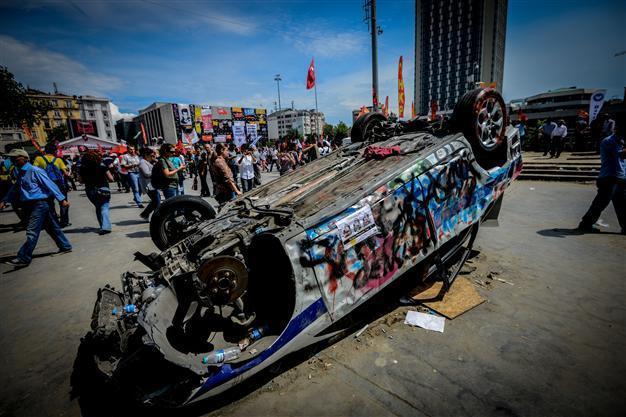Gezi Park protests may turn 2014 election calculations upside down
ANKARA - Hürriyet Daily News

A police car overturned by protesters is seen in Taksim Square which has been left to ‘occupiers’ since police forces withdrew from the area. DAILY NEWS photo, Emrah Gürel
“We have succeeded in five days in doing something that the opposition wouldn’t have been able to do in years. And we have made very different segments, groups and fractions meet each other under the dust who would never have gotten together under normal conditions.”
These words belong to Education Minister Nabi Avcı. As a matter of fact, this proclamation of Avcı is revealing the deep concern about the possible consequences of the Taksim Gezi Park protests.
The kids of Gezi Park who have passed the threshold of fear have a determined stance and this has opened the door to a process that might turn the 2014 plans of Ankara upside down. The surprise resistance rising from the streets has revealed that it will not be very easy to execute the plans made in the lobby rooms of politics, the targets determined, complicated arithmetic, the scenarios generated.
The resistance of young people in a small park has revealed that the calculations politicians make at home will not fit the real world.
It has been understood that the angry language of the street will deeply affect the local and general elections, the presidential elections, the new Constitution process, the presidential system, the Kurdish initiative, domestic calculations and balances of political parties and the economy. Those scenarios that have been generated before the Gezi Park protests have partially been changed. Let me share some of them being whispered…
President Abdullah Gül, with the stance he has adopted in the past week, has thoroughly strengthened his hand. It is appreciated that he tried to create harmony among the institutions of the state, that he contacted the main opposition leader and nongovernmental society, that he adopted a peaceful stance and made empathy. He acted as the president of the whole country and he increased his chances of a second term presidency. He exceptionally strengthened his hand for a possible “Putin-Medvedev” model changeover. He has given the message to the government with a thick underlining, “You cannot make 2014 plans without me. I am here.”
Prime Minister Recep Tayyip Erdoğan was aiming to ascend to the Çankaya Presidential Mansion either by writing the Constitution with the Peace and Democracy Party (BDP) and creating a “presidential system” or a “president affiliated with a political party” model. He had said there would be local elections in March 2014 and presidential elections in August where a referendum for the new Constitution could also be held. However, he preferred to ossify his own grassroots and confronted the other 50 percent. This tough stance of his may jeopardize his targets.
If the street cannot be persuaded and if polarization becomes sharper, then Erdoğan may need to pull back his card of early double polls for local and general elections in the first half of 2014. He may want to come out as victorious from the elections and write the new Constitution that includes the presidential system. The solution process of the Kurdish issue may come into play at this stage. Or, it may be brought up conjecturally that general elections be combined with Çankaya elections in August. In that case, Erdoğan selects the deputies himself. According to the degree of success in the elections, then he could take the step toward his presidential dreams. If the elections are not successful, then the risk of losing Çankaya may emerge.
Developments that affect 2014 may also cause the end to the ruling Justice and Development Party’s (AKP) internal regulation that bans deputies from running for office for three consecutive terms.
Erdoğan, instead of ascending to Çankaya, with the lifting of the three-term ban, may want to run for prime minister again and enter the elections. Gül may run for office for Çankaya and stay one more term.
The Gezi Park kids may disrupt the calculations of the main opposition Republican People’s Party (CHP) as well. If the CHP can properly analyze the rising rage on the streets, then it can turn this process to its advantage.
Is the democracy package coming?
The solution process that is under the shadow of the street protests is slowly proceeding. The Kurdistan Workers’ Party (PKK) is continuing its withdrawal; the Peace and Democracy Party (BDP) on the other hand, is saying, “It is time for a democracy package.” The ruling Justice and Democracy Party (AKP) wants to send Parliament to recess in the latest in the second half of July. According to our sources, the AKP will submit, if not the whole package, some minor amendments to the Parliament toward the end of June. The debate on the mini-democracy package, though, will be left until after the summer recess. The reason is that the AKP would prefer to take the step after seeing a full withdrawal…
Surprise expected in new Constitution?
The new Constitution-writing commission will work until July 1. Lately, there has been mention of a surprise. The number of articles that the commission has agreed upon is nearing 50. The president of the commission, Cemil Çiçek, wants to have the commission work all summer long so that the number of articles agreed upon increases. It is reported that his aim is, if the four parties cannot agree on a “Constitution from scratch,” then the could change the existing Constitution merely with the articles already agreed upon. Çiçek, an experienced politician, may be able to persuade the leaders…
